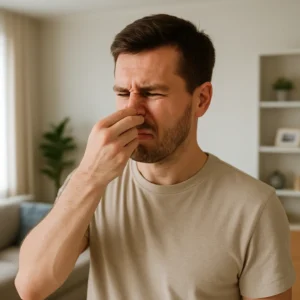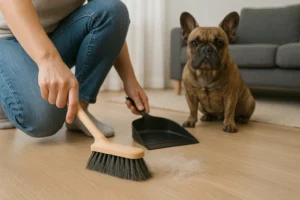Quick answer
In short, smelly flatulence comes from fermentable diets, swallowed air (brachycephalic aerophagia), food intolerance or dysbiosis, fast eating, and occasionally underlying disease. Start with highly digestible food, slower meals, and dog-specific probiotics; call the vet for red flags. (Vca, Veterinary Partner)
Introduction
Owners joke about the stink, but living with chronic dog gas isn’t cute. One evening it’s TV time; the room clears, and the Frenchie looks innocent. This article gives a step-by-step plan to cut odors with diet, feeding hacks, and evidence-based add-ons, plus signs that warrant an exam. It’s written for busy owners who want practical fixes, not guesswork. (Vca)
Table of Contents
- What’s normal vs. not
- The five big causes
- Fixes that actually help
- One-week quick-start plan
- When to see the vet
- FAQs
- Reference list

What’s “normal” gas vs. a problem?
Occasional, mild odor is expected; persistent, foul-smelling gas—especially with diarrhea, vomiting, weight loss, or behavior changes—deserves attention. Odor intensity often tracks volatile sulfur compounds (e.g., hydrogen sulfide) produced when gut bacteria ferment poorly digestible foods. That’s why diet quality and meal habits are the first levers to pull before supplements. (Vetlearn, MSD Veterinary Manual)
The 5 Big Causes (and Fix-first Tips)
1) Fermentable diets = smelly sulfur gases
Low-digestibility recipes, rich table scraps, legumes/soy, or dairy can drive fermentation and that “rotten egg” smell. A switch to highly digestible/low-residue nutrition reduces substrate for odor. Make any change gradually over 5–7 days to avoid upsetting the gut while you test results. (Vca)
2) Brachycephalic aerophagia (air-swallowing)
Flat-faced breeds inhale extra air when eating, snuffling, or stressing; the swallowed air inflates burps and farts. Slowing the meal, splitting portions, and addressing any upper-airway obstruction (BOAS) with a vet can meaningfully reduce gas volume over time. (Veterinary Medicine at Cambridge, Vet Times)
3) Food intolerance or microbiome imbalance
Some dogs react to specific proteins, lactose, or additives; others have dysbiosis that amplifies odor. A vet-guided elimination diet (often 8 weeks) and targeted canine probiotics/synbiotics are standard tools—useful, though benefits vary across studies and products. (Amazon Web Services, Inc., Today’s Veterinary Practice, Wiley Online Library)
4) Fast eating & stress (the gulping problem)
Gulpers swallow more air, and anxious mealtimes worsen it. Use slow-feeder puzzles, feed smaller meals, and create calm, separate eating spaces. These basics typically help within days and pair well with diet upgrades and routine tweaks. (Veterinary Partner)
5) Underlying gastrointestinal disease
If gas arrives with weight loss, blood in stool, vomiting, or chronic diarrhea, think beyond husbandry. Parasites, IBD, exocrine pancreatic insufficiency, and other GI disorders require diagnosis and targeted treatment—don’t delay the exam when red flags appear. (MSD Veterinary Manual)

Stepwise Fixes That Actually Help
Diet upgrades that matter
Choose a highly digestible commercial diet; limit dairy, table scraps, and highly fermentable fillers at first. If signs persist, your vet may recommend a hydrolyzed or limited-ingredient trial. Document stool quality, gas frequency, and odor daily during transitions to see trends clearly. (Vca, Amazon Web Services, Inc.)
Slow the meal, cut the air
Adopt a slow-feeder or snuffle mat, divide daily rations into two to three meals, and let the dog eat in a quiet space. For noisy breathing or heat intolerance, discuss BOAS assessment; improving airflow can reduce aerophagia and general comfort. (Veterinary Partner, Veterinary Medicine at Cambridge)
Support the microbiome (with realistic expectations)
Veterinary reviews suggest probiotics/pre-/synbiotics can help some GI signs, but results are strain- and case-dependent. Pick dog-specific products, introduce slowly, and evaluate over weeks, not days. Avoid random human remedies; coordinate with your veterinarian for appropriateness and dosing. (Today’s Veterinary Practice, Wiley Online Library)
One-Week Quick-Start Plan (Owner Checklist)
| Day | Action | Why it helps |
|---|---|---|
| 1–2 | Begin 25% new / 75% old diet; add slow-feeder | Reduces fermentable load; cuts aerophagia |
| 3–4 | Move to 50/50; stop dairy and scraps | Removes common triggers quickly |
| 5–7 | 75% new / 25% old; start vet-approved probiotic | Supports microbiome; track stool/odor |
If odor remains strong after two to three weeks, ask your vet about an 8-week elimination diet and further work-up. (Amazon Web Services, Inc.)

When to See the Vet (Red Flags)
Book promptly for weight loss, repeated vomiting, chronic diarrhea, blood or mucus in stool, abdominal pain, severe lethargy, or blue/purple gums. Also seek BOAS evaluation if breathing is noisy, exercise is limited, or heat intolerance is obvious; airway issues affect quality of life beyond gas. (MSD Veterinary Manual, Vet Times)
FAQs
Do French Bulldogs pass gas more than other breeds?
Often yes. Their facial structure predisposes them to aerophagia, which increases gas volume; diet then influences odor. Slow feeding plus digestible nutrition usually helps. (Veterinary Medicine at Cambridge)
Why is the smell so strong?
Bacteria ferment foods and release volatile sulfur compounds—notably hydrogen sulfide—which correlate with foul odor. Reducing fermentable substrates is the quickest lever. (Vetlearn)
Will probiotics fix this fast?
They can help some dogs but work gradually and inconsistently; choose dog-specific strains and give the plan a few weeks. Pair with diet and feeding changes for best odds. (Today’s Veterinary Practice)
Conclusion
The question “why do Frenchie farts smell so bad?” has a practical answer: gas volume comes from swallowed air and feeding habits; odor comes from what bacteria ferment. By upgrading to a digestible diet, slowing meals, and considering vet-advised probiotics, most households see relief. Track changes for two to three weeks, then escalate to an elimination diet or diagnostics if needed. (Vca)
References
- VCA: Flatulence in Dogs—causes and management. (Vca)
- VIN/Veterinary Partner: Flatulence—diet and pacing guidance. (Veterinary Partner)
- WSAVA: Nutritional Assessment Guidelines—diet history & elimination diets. (Amazon Web Services, Inc.)
- MSD Vet Manual: Digestive disorders & red-flag signs. (MSD Veterinary Manual)
- Cambridge BOAS Group / Vet Times: Brachycephalic airway disease overview. (Veterinary Medicine at Cambridge, Vet Times)
- Today’s Veterinary Practice: Probiotics & dysbiosis—nuanced evidence. (Today’s Veterinary Practice)
- Vetlearn review: Odor chemistry—volatile sulfur compounds in flatus. (Vetlearn)
- French Bulldogs cost calculator: Frenchie cost
.



